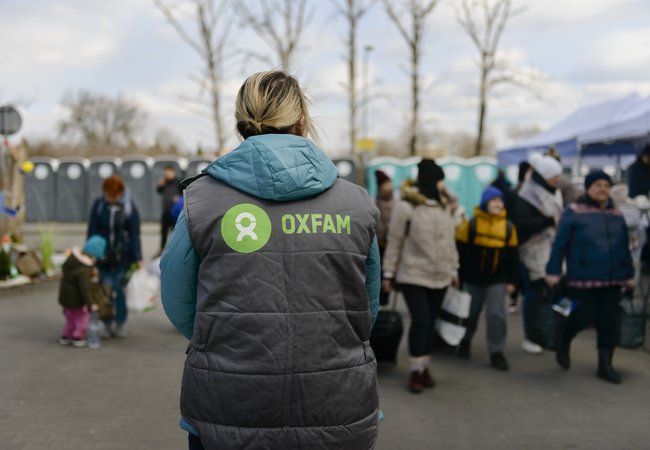- Annual Report and accounts 2023-24
- Oxfam's Constitution
- Legitimacy and accountability
- Oxfam GB's Open Information Policy
- Corporate responsibility
- Information for suppliers
- Oxfam GB's Gender Pay Gap
- Oxfam's Code of Conduct
- Oxfam’s Zakat Advisory Panel
- Learning and evaluation
- Modern Slavery Act statement
- Fundraising and responding to vulnerable people
- Plans, reports and policies archive
- Oxfam's Zakat policy
- Oxfam's Impact: A Decade of Insight
- Effectiveness Reviews
- Food Producer Rights
Oxfam staff member Michelle in Poland. Image: Tineke D'haese/Oxfam


Corporate responsibility
Oxfam GB is committed to ensuring that its business practices are aligned with its mission and values.
Oxfam’s corporate responsibility policies and positions
Anti-slavery policy
Oxfam GB is a complex organisation, with operations and supply chains which span multiple countries. The nature of the work we do and the countries we source from and operate in, mean that despite our best efforts, there is a risk that various forms of modern slavery could exist. This policy sets out OGB's anti-slavery standards for our operations, supply chain and implementing partners as well as our approach to remediation.
Gender equality policy
Our vision of gender equality is that through our work many more women will gain power over their lives. This will happen through changes in attitudes, ideas and beliefs about gender relations, and increased levels of women's active engagement and critical leadership in institutions, decision-making and change processes. To achieve this vision we will put poor women's rights at the heart of all that we do.
Ethical and environmental policy
Oxfam GB recognises the importance of sustainable development for people living in poverty, and the long-term benefits of becoming a more sustainable organisation. This policy outlines Oxfam GB’s standards for working with its suppliers to take responsibility for the ethical and environmental impacts of our operations and supply chains.
Our procurement falls into four main categories: central procurement, Sourced by Oxfam (retail), humanitarian and international programmes.
Retail Ethical and Environmental Strategy
The Retail Division of Oxfam GB has an Ethical and Environmental Strategy, which sets our aspiration to be a driving force in the area of sustainability, continually improving our ethical and environmental impact, seeking innovation, and upholding the integrity of Oxfam’s brand and public positions.
This strategy includes key targets around waste, energy and our Sourced by Oxfam range, and we report on this and our wider organisational commitments in our annual report and the retail targets are included in the supplementary Ethical and Environmental Report.
Sourced by Oxfam (retail)
The Sourced by Oxfam (SbO) team buys all the new products we sell in our online and UK shops. The ‘SbO Ethical & Environmental Supplier Framework’ applies learning from Oxfam’s global programmes and engagement with businesses to guide our everyday retail sourcing decisions. The framework enables us to be more transparent about how we work with our suppliers and outlines what Oxfam considers good practice to deliver sustainable, positive impacts for the people working in our retail supply chain. The framework is helping us to learn from, celebrate and share good practice already demonstrated by our suppliers and we are using it to incentivize our suppliers to work with us to raise ethical and environmental standards in our supply chain over time.
As part of our commitment to transparency and to support us to be held accountable for the impacts of doing business in our value chain we publish our current list of retail suppliers.
Export of second hand clothing
Oxfam no longer directly exports clothing to overseas markets, instead we try to find solutions within the UK. We do our best to ensure that as few donated clothes as possible end up in landfill. Most of the stock which is not sold in shops is collected by third party recycling companies who commit to working in line with our Textile Export Policy.
Ethical standards for partnerships
Working with partners is integral to achieving our mission to find lasting solutions to poverty and injustice. As part of this, Oxfam GB will accept donations (including cash and gifts in kind) from any source that contributes towards Oxfam's mission, unless there is strong reason to believe that doing so risks harm to people living in poverty, compromises the independence of our advocacy, campaigning or programme work, or will cause significant damage to Oxfam GB's integrity and/or reputation.
Oxfam GB carries out due diligence on our partners in line with our approach to corporate responsibility - balancing potential conflicts with our campaigning priorities and ensuring integrity on core issues relating to our mission to end global poverty. We do not accept funds from companies manufacturing arms, tobacco or pornography.
Reporting and accountability
Annual Report and Accounts
Oxfam GB is committed to strengthening our accountability, being transparent and judging the impact of our work on the people and communities reached by our programmes. We continually monitor, evaluate and learn from our stakeholders to review the outcome achievements and challenges of our work on the people and communities reached by our programmes.
Oxfam GB's gender pay gap report
The gender pay gap shows the difference in the average pay between all men and women working for an organisation, irrespective of their job or position. It is not a comparison of pay between men and women doing like for like roles or jobs of equal value and Oxfam always pays men and women the same for the same work. All organisations in the UK, who employ more than 250 workers, are required to publish a report on their gender pay gap.
Modern Slavery Act transparency statement
The UK's Modern Slavery Act 2015 requires organisations with an annual turnover of at least £36m to make a public statement on steps they are taking to identify and prevent modern slavery in their operations and supply chains.
Oxfam GB advocated for this policy development, and this statement describes steps taken in relation to our own operations and supply chains. Our first statement gave detailed information about our policies and processes in order to demonstrate transparency on this challenging issue and to encourage other companies to be transparent. This statement is an update on progress against the commitments we made in our first statement and shares two case studies of how we work.
Carbon and Environmental reporting
We are committed to managing our ethical and environmental impact and report annually on this in our Annual Report and Accounts. We also set out below our SECR methodology statement and our supplementary Ethical and Environmental Report.
Streamlined Energy and Carbon Reporting (SECR)
Our SECR disclosure can be found in the Ethical and Environmental Standards section of our Annual Report and Accounts. In that disclosure, the methodology that we used in compiling our data is briefly introduced. For those readers that are interested, the purpose of this document is to supplement that commentary with a more detailed explanation of how we compile the data used to report our energy and carbon impacts.
Methodology Statement for 2019-20
Supplementary Ethical and Environmental Report
Oxfam’s main Ethical and Environmental Report can be found in the full Annual Report and Accounts for 2022/23. For those readers who are interested, the purpose of this supplementary report is to provide a more detailed review of Oxfam’s activities in this area.
Oxfam’s carbon commitment
We know that we must play our part in tackling the climate emergency, for the world's poorest people, and for all of us. As a priority, we are significantly reducing emissions related to our own activities, and have committed to at least a 71% absolute reduction by 2030 (from a 2011/12 baseline, without offsetting), with a commitment to being zero carbon before 2040. This will be reviewed each year and increased as new opportunities and technology become available.
For more information about the scope of our carbon commitment please see our Supplementary Ethical and Environmental Report via the link above
Other policy documents
Memberships
UN Global Compact
In July 2018, Oxfam GB became a participant of the UN Global Compact (UNGC) and our second Communication on Engagement was published in November 2023.
Oxfam GB has a long history of engagement with the UNGC. We have used our critical friend approach to support UNGC initiatives such as the; Multi Stakeholder Advisory Committee (MAC) Group of the UNGC & Global Reporting Initiative Action Platform Reporting on the Sustainable Development Goals and were part of the UNGC's Task Team to support the delivery of a Blueprint for SDG Leadership.
The UNGC is the world's largest corporate sustainability initiative. It is a call to companies to align strategies and operations with Ten Principles on human rights, labour, environment and anti-corruption to advance societal goals, such as the SDGs.
The Ethical Trading Initiative
Oxfam GB is a founder member of Ethical Trading Initiative (ETI), with active Board and NGO caucus representation.
The ETI is a leading alliance of companies, trade unions and NGOs that promotes respect for workers' rights around the globe. Their vision is a world where all workers are free from exploitation and discrimination, and enjoy conditions of freedom, security and equity.
We have adopted the ETI Base Code of labour practice, which is derived from the conventions of the International Labour Organisation (ILO) and we have made a commitment to align our existing due diligence processes with the ETI Human Rights Due Diligence Framework.
The Living Wage (UK)
Oxfam has been an accredited Living Wage Foundation employer since 2013 and we have a commitment to pay at least the Living Wage Foundation rate for all UK employees.
We support the Living Wage Foundation because we believe that fair wages, along with more secure, predictable and progressive work can be instrumental in addressing the high levels of poverty we are now seeing in working households in the UK.
Make My Money Matter
At Oxfam we recognise the power and potential of finance to create a fairer and more environmentally sustainable world. The default investment approach in our pension scheme for staff is ethically screened and aligns with our organisational values and mission. Oxfam supports the Make My Money Matter people-powered campaign for all organisations - businesses, NGOs, universities and local authorities - to commit to pension schemes that invest in a better future.